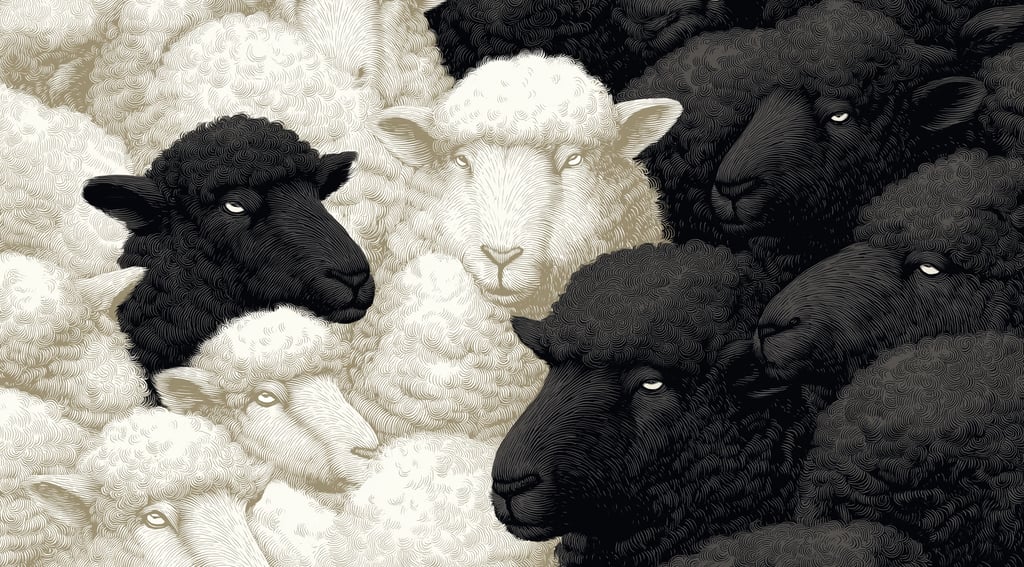ALONE AMONG MANY
LONELINESS IN A GROUP AND THE POWER OF SELF-REFLECTION
Birte Brunner
11/14/20252 min read


Belonging is a basic human need. But what happens when you feel like a stranger in the middle of a group? When you are there, but don't really belong? The loneliness of the individual in the crowd is not a new phenomenon—but it is a silent one.
Not a drama, but a subtle irritation. And it often harbors the feeling: “What's wrong with me?”
The illustration above shows what many people feel deep down but rarely express:
The feeling of being the black sheep among whites – or the white sheep among blacks. Both symbolize the same thing: being different.
And yet it's worth taking a second look.
Same Origin, same Species – just different.
Because all these sheep—whether white or black—belong to the same species. They are genetically related, socially influenced, and have the same needs, instincts, and ways of life. The only difference is in their appearance—the color of their coat.
Often, what distinguishes us from one another at first glance is merely an external appearance. Nevertheless, this outer layer is sufficient to feel – or have imposed upon us – profound boundaries.
This can easily be applied to humans: skin color, clothing, dialect, behavior, opinion, temperament—all characteristics that are visible or perceptible, but say nothing about personality, inner attitude, or belonging. Nevertheless, they can create a sense of alienation.
Between Conformity and Authenticity
Dynamics quickly develop in groups:
People recognize each other, form commonalities, create closeness. Those who are too different are sometimes not only overlooked, but subtly questioned.
This often happens unconsciously – through ironic remarks, through omission, through nonverbal exclusion ... and at some point the quiet but urgent question arises: Is this really my place?
Loneliness in a Group: a Paradox?
It may seem contradictory, but it is the truth: many people often feel the greatest loneliness when surrounded by others.
But why? Because visibility alone is not enough. Resonance is needed. And this does not come from mere presence, but from genuine interest, real connection, and mutual acceptance.
Those who regularly question themselves in groups, who bend over backwards, conform or remain silent in order to belong, do not live in community, but in conformity. And conformity without acceptance is not a home.
The Gift of being different
Being different is not a weakness. It is a sign of identity and often also a silent mirror for others who do not dare to deviate from the norm.
Those who are ‘different’ bring new perspectives, break with habits, question things – and that can be challenging. Sometimes it is easier to reject the unfamiliar than to see oneself reflected in it.
But ultimately, the ‘black sheep’ is not a different being – it is part of the whole. Maybe it looks different, maybe it stands out. But it belongs.
Self-Reflection instead of Self-Denial
Those who feel like outsiders are often faced with a crucial question:
Do I continue to adapt – or do I find the courage to take myself seriously?
Self-reflection means asking yourself:
Is it my feeling of alienation – or does the group simply not reflect who I really am?
Is my Desire to Belong greater than my own Identity?
What does it cost me to belong – and what do I gain when I no longer have to force it?
Conclusion:
Between Loneliness and Liberation
Being different is not a burden – as long as you don't abandon yourself.
Loneliness in a group can be an invitation:
To return to yourself.
To search for people for whom differences are not a problem, but potential.
And to the realisation:
Not every Group is your own –
but somewhere there is one waiting for you
where you are not conforming, but accepted.

